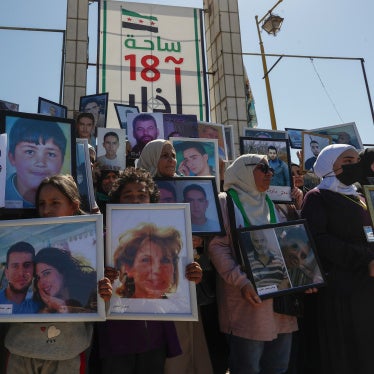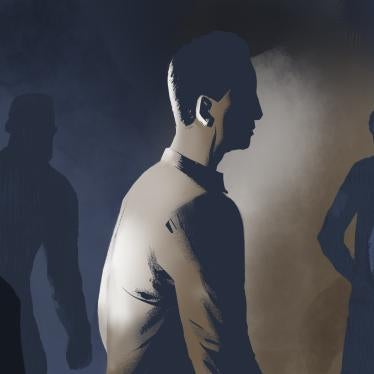A photo of an elderly Syrian man standing in the middle of a graveyard was on the front page of many newspapers worldwide last week. He was mourning not only his sons but, tragically, his grandsons as well. All were killed in the armed conflict that has cost Syria 60,000 lives so far, according to Navi Pillay, the UN high commissioner for human rights.
Pillay’s grim announcement came on the heels of yet another horrific video posted on YouTube, of what appear to be groups of military personnel relishing acts of wanton sadism and cruelty against civilians, slicing their skin before breaking their skulls. That same week, a massive explosion killed many people waiting in a long line to fill up their cars at a gas station in Damascus. The week ended with the Syrian president delivering a speech in which he outlined his plan to end the crisis but failed to mention justice or accountability -- not surprising given his role as head of the Syrian military.
With these gruesome images and numbers for death and torture, one wonders how Syrians can ever reconcile with this bloody episode and live together again.
Syrian social networks abound with calls for restraint, but they also relay many angry voices calling for revenge. Many Syrians have been watching their lives being shattered since the popular uprising against the Assad regime erupted in March 2011. Many promises have been made, domestically and internationally, to bring those responsible to justice. But few steps have been taken. With the lack of concrete measures, an increasing number of Syrians would condone, if not take part in, reprisal attacks against regime loyalists and their families and possibly at the Alawite community more broadly as sectarian tensions increase.
In the absence of a reliable mechanism that Syrians know will bring them justice, revenge killing on a wide scale will be likely. And unless Syrian and international players move beyond promises for accountability and offer a concrete plan for justice, Syrian soldiers and armed militias would not be deterred by the possibility of standing trial for their atrocities.
Examples from South America, Africa and the former Yugoslavia remind the world that it takes great efforts and a strong commitment to justice for a country to move forward and for a society to reconcile after a bloody conflict. Trials, truth commissions, hearings and painful testimony help unveil information about lost ones. Reparations and commemoration help people heal. Putting those responsible for the worst crimes on trial ensures that individuals and not groups are held accountable, and that they go to prison rather than to even more senior positions of authority.
So far, how Syrians intend to part with a past built on impunity is still not clear. The time is now to start such initiatives. Individual, group and government-funded initiatives seems to have emerged, randomly, to keep count of abuses committed and document violations for future use in court, but far more systematic efforts are needed.
One institution that can play a strong role in helping Syrians find justice is the International Criminal Court (ICC). Even though the Syrian government has never joined the ICC, the UN Security Council could vote to grant the court jurisdiction. When a situation is referred to the ICC, the court can then examine all serious international crimes committed during the period under review and investigate all suspected perpetrators, regardless of the side they are on.
States, particularly Arab countries that have repeatedly voiced concern over the killings in Syria, should join the mounting calls for accountability by pressing the Security Council to refer Syria to the court, as the forum most capable of effectively investigating abuses there. Switzerland is leading an initiative that calls on the Security Council to do exactly this, and countries in the region should urgently join this global appeal for justice for the Syrian people.
Unless Syrians feel their losses are acknowledged and handled by a trusted institution, it seems likely that many will seek their own justice themselves, against a person, a group or a sect. Repercussions can go on for years, causing more deaths and suffering.
Opposition leaders and armed groups also need to understand that their credibility heavily rests on concrete steps they foresee for justice, as it is lack of it that prompted Syrians to rise in the first place. The slogan for the Syrian uprising is, “The Syrian people must not be humiliated.” One of the most striking images early in the uprising is of a man saying on camera “I am a human being, not an animal… and all fellow Syrians are like me, humans.”
Dignity can only be guaranteed when justice and human rights prevail, shielding people from abuses by armed groups, be they pro or anti-government and ensuring that those who commit such crimes are held accountable. Syrians deserve justice after nearly two years of bloodshed. They long for fairness after years of impunity. Any planning for the future of Syria should contain the appropriate tools for the country to reconcile on the basis of justice.
Peace envoys sometimes claim they cannot negotiate peace and seek accountability for human rights violations at the same time. They can and they should because peace without justice is a mirage that in the case of Syria could be washed away quickly in a bloodbath of revenge killings. Justice and accountability are the foundations for durable peace and a genuine settlement in Syria. That old man standing in the graveyard should know that those who commit war crimes will not get away with it.
Tamara Alrifai is Middle East and North Africa advocacy director at Human Rights Watch.








